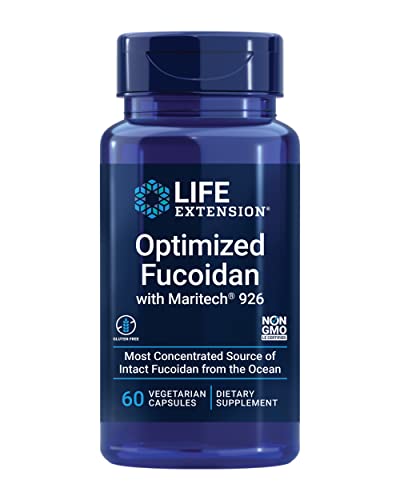Fucoidan for Exercise Recovery: Does It Help?
Quick Summary: A recent study found that taking fucoidan supplements might help reduce inflammation after intense exercise. While it didn't boost performance, it showed promise in reducing certain inflammatory markers.
What The Research Found
This study looked at how fucoidan, a compound found in seaweed, affects the body after tough workouts. The researchers discovered that fucoidan helped lower levels of inflammation in the body immediately after exercise. Specifically, it reduced two key inflammatory markers, IL-6 and TNF-α. However, it didn't seem to improve muscle soreness or how well people performed during the exercise.
Study Details
- Who was studied: 16 healthy adults (8 men and 8 women) in their early twenties.
- How long: Participants took either fucoidan or a placebo (a dummy pill) for 14 days.
- What they took: 1 gram of fucoidan daily, derived from Undaria pinnatifida seaweed.
What This Means For You
If you're an athlete or someone who regularly does high-intensity workouts, fucoidan might offer a small benefit in reducing inflammation right after exercise. It could potentially help your body recover a bit faster. However, it's important to remember:
- It's not a magic bullet: Fucoidan didn't improve performance or reduce muscle soreness in this study.
- More research is needed: This study was small, and we need more evidence to be sure of the benefits.
- Talk to your doctor: Before taking any new supplements, especially if you have any health conditions.
Study Limitations
- Small sample size: The study only included 16 people, so the results might not apply to everyone.
- Short duration: The study only lasted 14 days, so we don't know the long-term effects.
- Limited scope: The study only looked at the immediate effects after exercise.
- Specific group: The study focused on young, healthy adults, so the results might be different for older people or those with health issues.
Technical Analysis Details
Key Findings
Fucoidan supplementation (1 g/day of Undaria pinnatifida fucoidan, UPF) significantly reduced acute post-exercise increases in inflammatory cytokines interleukin-6 (IL-6) and tumor necrosis factor-alpha (TNF-α) compared to placebo. However, no differences were observed in muscle soreness, immune cell counts, or exercise performance metrics. UPF demonstrated a favorable safety profile with no adverse events reported.
Study Design
This was a double-blind, placebo-controlled, crossover trial involving 16 healthy adults (8 males, 8 females; mean age 24.3 ± 3.1 years). Participants underwent two 14-day supplementation periods (fucoidan vs. placebo), separated by a washout phase. High-intensity exercise (HIE) was induced via downhill running. Blood samples and performance measures were collected pre-exercise, immediately post-exercise, and 1 hour post-exercise.
Dosage & Administration
Participants received 1 g/day of UPF or placebo in identical capsules for 14 days prior to HIE. Supplementation was continued on the exercise day. The crossover design ensured all individuals experienced both conditions.
Results & Efficacy
- IL-6: UPF reduced the post-exercise increase by 22% compared to placebo (p = 0.048).
- TNF-α: UPF showed a 15% lower rise post-exercise (p = 0.035).
- CRP: No significant differences between groups (p > 0.05).
- Immune markers: Neutrophil and lymphocyte counts increased post-HIE in both groups, but no inter-group differences were detected.
- Exercise performance: No changes in vertical jump height, sprint time, or muscle soreness (p > 0.05). Effects were limited to the first hour post-exercise, with no sustained differences observed.
Limitations
- Small sample size (n=16) limits generalizability.
- Short supplementation duration (14 days) may not reflect long-term effects.
- Acute post-exercise focus; outcomes beyond 1 hour post-HIE were not assessed.
- Homogeneous population (young, healthy adults) restricts applicability to older individuals or those with chronic inflammation.
- Lack of significant effects on most immune and performance metrics suggests limited clinical impact. Further research is needed to evaluate higher doses, longer durations, and diverse populations.
Clinical Relevance
For athletes engaging in repeated high-intensity exercise, UPF supplementation (1 g/day) may modestly mitigate acute inflammation (IL-6, TNF-α) without affecting immune cell activity or performance. However, the absence of prolonged effects and lack of improvement in functional outcomes (e.g., muscle soreness, sprint recovery) indicate it should not replace established recovery strategies. The safety profile supports its use as a short-term adjunct, but larger trials are required to confirm efficacy in broader populations or with chronic supplementation.
Original Study Reference
Effects of fucoidan supplementation on inflammatory and immune response after high-intensity exercise.
Source: PubMed
Published: 2023
📄 Read Full Study (PMID: 37331983)




